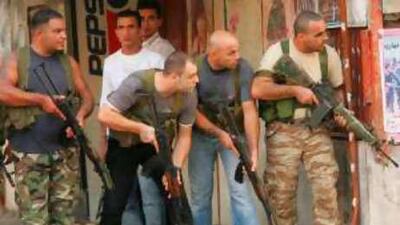Beirut // Tensions escalated at the most crowded and heavily armed Palestinian refugee camp in Lebanon yesterday as Palestinian and Lebanese leaders scrambled to cool tempers. On Monday night the pressure began building between the factions after a commander with the dominant Fatah demanded that Jund al Sham, an Islamic group, turn over the killers of a prominent Fatah activist.
Yesterday morning, the commander, known as Alyno, was reported to have told Jund al Sham, which has clashed with Fatah-affiliated security forces for control of the camp for years, that the killers of Abou Maher al Saadi should be turned over to Lebanese security authorities by nightfall or the camp will be "turned into flames", according to a Palestinian Liberation Organization security official, who requested anonymity because of the sensitivity of the situation.
Gunmen widely considered to be affiliated with Jund al Sham, a radical Sunni group, killed Mr Saadi on Monday after a series of gun battles that also left two Jund al Sham fighters dead. Ain el Hilweh has been the scene of escalating violence since the deadly siege in the summer of 2007 in the northern camp of Nahr al Bared between the Lebanese Army and members of Fatah al Islam. More than 50,000 Palestinians live within the one-square-kilometre Ain el Hilweh camp just outside Sidon. Lebanese intelligence officials describe the warren of alleys and low-slung homes as a hotbed for Sunni and Palestinian militants and cite at least 20 armed militant groups as residing inside the walls of the camp.
Over three months last year, most of the camp was destroyed, with hundreds killed on both sides and more than 10,000 residents of the camp left homeless. Many Fatah al Islam fighters are thought to have fled Nahr el Bared for Ain el Hilweh and security forces have been closely monitoring Islamic groups there to prevent a new outbreak of fighting. The top PLO military official in the camp, who also heads a multiparty security effort, said the situation is worsening.
"We have not slept in a day as the situation in the camp is very tense, and we're holding many meetings to prevent more violence," Munir al Makdah said by telephone, adding that the situation could be related to the national dialogue held the day before between rival Lebanese factions. "Some sides want to start a conflict inside the camp," Mr Makdah told a local newspaper, al Safir. "The assassination of the historical man in the camp, Abou Maher al Saadi, a big figure in Fatah [and in the camp] - his assassination is aimed to take the conflict in the camp to the dialogue table" at the presidential palace.
Lebanon's estimated 300,000 Palestinian refugees lack many basic rights, but are allowed to manage their own affairs in the camps. Many armed groups continue to keep weapons for resistance against Israel. Disarming these groups - as well as Hizbollah - has been a constant source of friction among Lebanese parties. Mr Makdah accused several outside groups of fomenting violence in the camp for political gain. He said recent weeks had seen an influx of money and weapons to several groups that had destabilised the situation.
"Money and weapons have been distributed and given to different parties inside the camp aiming to turn it into another Nahr al Bared," he said. A Lebanese intelligence official who works on issues with the camp said that, while yesterday was relatively quiet compared to Monday, it could return to chaos without warning. The Lebanese government barred journalists from entering the camp yesterday, so little independent information could be gathered. Mr Makdah said hundreds of families had been displaced by the fighting and were currently unable to return to their homes inside the camp.
One fighter aligned with Fatah, who asked that his name not be used for fear of reprisal, said it was quiet before Mr Saadi's funeral, but that the Fatah leadership "is busy at the moment trying to fix the problem and asking the members of Jund al Sham who killed Abou Maher to surrender themselves to us so we can deliver them to the Lebanese authorities. If they don't, things won't be good in the camp".
Another camp resident, who fears for his life and also requested anonymity, said the clashes are the result of Mr Makdah pursuing the Jund al Sham fighters to prevent them from causing problems similar to last year's disaster in Nahr al Bared. Said another resident: "The situation in the camp is not good at all. The streets are empty, and people are scared. The Fatah militants are all after the Jund al Sham members. After they bury Abou Maher, it might go back to clashes."
mprothero@thenational.ae

